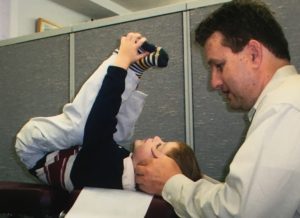Chiropractic care – suitable for all ages – can help heal a wide range of health problems.

Infants (Birth – 2)
A spinal check up is tremendously important for new parents to consider. The birthing process puts a tremendous strain on the neck, shoulders and head. Infants suffering from trauma during the birthing process often suffer needlessly from the following. Fortunately, a spinal check up after birth can go a long way to preventing and treating the following:
Blood disorders
Colic
Constipation
Croup
Damage caused during birthing process (one weak side, flared shoulder blades, a shorter leg, reduced neck mobility)
Frequent colds
Immune system malfunctions
Improper spinal alignment
Inability to fall asleep
Irritability
Neck tilt
Poor coordination
Skin conditions
Toddlers & School Age Children (2 – 12)
Regular spinal check ups for toddlers and school age children are vital to ensure your children can grow up to be their very best. Learning to walk creates a never ending round of falls, bumps, and sometimes, a tumble or two down the stairs. Then there are the falls that occur on playgrounds, roller blades, and scooters. All these accidents can lead to Vertebral Subluxations, which can directly lead to a myriad of other problems. Chiropractic care is a natural, drug free approach to preventing and maintaining the health of the entire family, naturally.
Asthma & wheezing
Bed wetting
Behavioral disorders
Bowed legs
Constipation
Damage caused during birthing process (one weak side, flared shoulder blades, a shorter leg, reduced neck mobility)
Frequent colds
Headaches
Irritability
Inability to fall asleep
Inability to meet developmental milestones
Poor concentration
Scoliosis
Sensory integration disorder
Sinus problems
Skin disorders
Social difficulties
Sore back / neck / joints
Tweens & Teenagers (8 – 19)
Regular check ups for your tween and teenager may mean the difference between a child that is mentally, emotionally, and physically optimally well or not. Many parents complain about the mood swings, emotional outbursts, and the stress involved with dealing with their newly emerging independent child. Other parents worry about their teen that has suffered from a sports injury, fender bender, or a child not succeeding in school. If this sounds like your child or your child suffers from any of the following, chiropractic care can probably help, naturally.
Anxiety disorders
Asthma & wheezing
Behavioral disorders
Constipation
Damage caused during birthing process (one weak side, flared shoulder blades, a shorter leg, reduced neck mobility)
Difficulty maintaining school grades
Frequent colds
Headaches
Irritability
Inability to concentrate
Inability to fall asleep
Inability to meet developmental milestones
Nervousness disorders
Poor concentration
Recently diagnosed with a new disorder and/or disease
Scoliosis
Sensory integration disorder
Sinus problems
Skin disorders
Social difficulties
Sore back / neck / joints
Adults 19 and up
Around the age of 20, people start popping muscle relaxants and even pain killers to deal with a car accident, an injury, or the normal stresses of life. This is an accepted practice but does not respect the fact that your body wants you to “fix” the problem, not drug the problem. By middle age, our necks are stiff, our lower backs hurt, and we have lost mobility and flexibility. As the pain increases, our reliance on over-the-counter medication increases.
There is a better solution. Regular check ups can detect and eliminate Vertebral Subluxation and thus, naturally eliminate the needless pain cycle we have all come to know so well. Do your body a favor — treat the problem, not the symptom. You can reclaim your health and wellness naturally.
Asthma & wheezing
Arthritis
Back pain
Blood pressure problems
Behavioral disorders
Constipation
Depression
Diabetes
Diagnosed with a new disorder and/or disease
Digestive problems
Difficulty breathing
Difficulty maintaining focus
Fatigue
Fibromyalgia
Frequent colds
Hearing problems
Heartburn
Heart problems
Indigestion
Knee problems
Leg pain
Liver problems
Irritability
Inability to concentrate
Inability to fall asleep
Insomnia
Migraines
Neck Pain – reduced neck mobility
Nervousness disorders
Numbness in hands, arms, legs or feet
Poor circulation
Poor concentration
Poor coordination
Poor posture
Prenatal and postnatal pregnancy health issues
Reduced mobility
Sciatica
Scoliosis
Sinus problems
Skin disorders
Shoulder pain
Social difficulties
Ulcers
Vision problems
Weak left or right side
Whiplash